《新编大学实用英语教程》第一单元第一课听说练习
新编英语教程1练习册及答案

新编英语教程1练习册及答案### Unit 1: Greetings and IntroductionsExercise 1: Fill in the blanks1. When you meet someone for the first time, you can say, "Hello, my name is ________."2. If you want to ask someone's name, you can say, "May I know your ________?"3. To greet someone in the morning, you can say, "Good________!"4. When you meet a friend after a long time, you can say, "It's been a long time! How have you ________?"5. If you want to introduce someone, you can say, "This is ________, a friend of mine."Answers:1. [Your Name]2. name3. morning4. been5. [Name]Exercise 2: Match the phrasesMatch the appropriate greeting to the situation.(A) Good night!(B) Good morning!(C) Hello, nice to meet you.(D) How do you do?(E) See you later!1. When you leave a party at night: ________2. When you meet someone in the morning: ________3. When you meet someone for the first time: ________4. When you meet someone in a formal setting: ________5. When you are about to part ways: ________Answers:1. (A)2. (B)3. (C)4. (D)5. (E)Exercise 3: Complete the dialogueA: Hi, I'm John.B: _________A: Nice to meet you, too. I'm from New York.B: _________A: Yes, it's a big city. Where are you from?B: _________A: Oh, really? I've never been there. What's it like?Answers:1. Hello, I'm Mary.2. That's a big city.3. I'm from a small town.Exercise 4: Write a short paragraphIntroduce yourself to a new classmate. Include your name, where you're from, and a brief description of your interests.Sample Answer:Hello, my name is Alex. I'm originally from California, butI've recently moved to this city for school. I'm really into music and I play the guitar in my free time. I'm also a big fan of hiking and exploring new places. It's great to meet you and I'm looking forward to getting to know everyone in the class.。
新编英语听力教程1答案
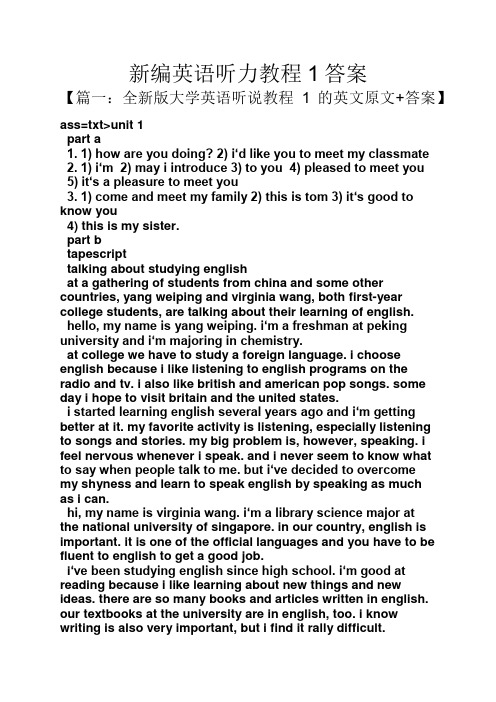
新编英语听力教程1答案【篇一:全新版大学英语听说教程1的英文原文+答案】ass=txt>unit 1part a1. 1) how are you doing? 2) i‘d like you to meet my classmate2. 1) i‘m 2) may i introduce 3) to you 4) pleased to meet you5) it‘s a pleasure to meet you3. 1) come and meet my family 2) this is tom 3) it‘s good to know you4) this is my sister.part btapescripttalking about studying englishat a gathering of students from china and some other countries, yang weiping and virginia wang, both first-year college students, are talking about their learning of english. hello, my name is yang weiping. i‘m a freshman at peking university and i‘m majoring in chemistry.at college we have to study a foreign language. i choose english because i like listening to english programs on theradio and tv. i also like british and american pop songs. some day i hope to visit britain and the united states.i started learning english several years ago and i‘m getting better at it. my favorite activity is listening, especially listeningto songs and stories. my big problem is, however, speaking. i feel nervous whenever i speak. and i never seem to know whatto say when people talk to me. but i‘ve decided to overcomemy shyness and learn to speak english by speaking as muchas i can.hi, my name is virginia wang. i‘m a library science major atthe national university of singapore. in our country, english is important. it is one of the official languages and you have to be fluent to english to get a good job.i‘ve been studying english since high school. i‘m good at reading because i like learning about new things and new ideas. there are so many books and articles written in english. our textbooks at the university are in english, too. i knowwriting is also very important, but i find it rally difficult.when i graduate from the university i would like a job in the city library where i can read all kinds of new books.exercise 1: b dexercise 2: 1)yang 2)chemistry 3)likes listening to english programs on radio tv; enjoys english pop songs 4) several years ago 5) listening; speaking6) wang 7) library science 8) to get a good job 9) in high school 10) reading; writingdialogue 11) may i sit here? 2) sure. 3) nice day 4) warm and sunny 5) computerdialogue 21) about four years 2) very much 3) it‘s very usefuldialogue 31) listening 2) i find listening rather difficult 3) listen to this tape 4) perhaps i shouldpart c1)skills 2)worry 3)focus 4)feel 5)understood 6)carefully7)problems8)understand 9)main 10)detailsunit 2part a1.closing2.opening3.closing4.opening5.opening6.opening1-5 a b b a b 6-10.a b a b bpart btapescript how to improve your conversation skillsto speak to people in a foreign language requires courage and a willingness to make errors. some people are so afraid of making mistakes that they never open their mouths. and that‘s the biggest mistake of all. now if you have courage and are ready to make a few errors, what do you say?first of all, you have to open the conversation. finding an appropriate topic is half the battle. some topics, such as the weather and news, work well. but others, such as age, money or people‘s appearance do not. the following are some good ways to open a conversation.weather –it sure is cold today, isn‘t it?news – did you hear about that terrible forest fire?a conversation in a foreign language doesn‘t always go smoothly. sometimes your partner talks too fast and you find it difficult to follow. not to worry, though. you can always askyour partner to repeat what he has said or to speak more slowly. for example, ―excuse me, but could you say that again?i didn‘t catch it.‖ or ―could you speak more slowly, please?‖at the end of a conversation you need to find a way to close it in a polite way. ―well, i really need to be going,‖ or ―it was nice talking to you‖ are frequently used by people to end a conversation.exercise 1: 1. b c a 2. dexercise 2: 1. a. age b. money c. people‘s appearance2. a. say that again? i didn‘t catch it.b. speak more slowly, please3. a. really need to be going b. nice talking to you.dialogue 11. do you have a minute?2. what can i do for you3. several4.i wonder if you could tell me how i could improve my oral english5. every time i open my mouth i seem to make errors6. be willing to make some errors at the beginning.7. i shouldn‘tbe afraid of making mistakes. 8. try to speak english as much as i candialogue 2:1. cold this morning2. get even colder3. won‘t get as cold as4. terrific. that guy who won the first prize speaks really fluent english. i do admire him.5. me, too.6. i have an appointment with the dean.part ctapescript smile when you read thishow good is your memory? answer these four questions:what did you have for breakfast yesterday? what clothes did you wear last friday? who did you talk to yesterday? where did you go last saturday? if you can answer all four questions, you memory is very good.memory is important for leaning language skills. education specialists in england want to help people improve theirreading abilities. they want students to remember the booksand articles they read. the specialists found something to help: facial expressions. they gave ten students a happy article toread. five of the students read the happy article while smiling. fivestudents read the happy article while frowning. then they answered comprehension questions the smiling students remembered more of the happy article than the frowning students.then the specialists gave ten students another article to read. it was an angry letter to the editor of a newspaper. five students read the angry article while smiling, and five students read the angry article whiling frowning. which group remembered better? you‘re right. the frowning students.the specialist don‘t know why facia l expressions help memory. they are continuing to study the relationship between the mind and the body. until they find the answer, keep smiling (or frowning?)!exercise:1. if one can answer all the four questions, his memory is thought to be good. (i hear it.)2. the smiling student could remember more happy articles than the frowning students. (i hear it.)3. education specialist from england haven‘t found the best way to help people improve reading abilities. (i can not infer it.)4. the specialists are trying to explain the reason why facial expressions can help memory (i can infer it.)5. according to the speaker, facial expressions might affect a person‘s memory. (i can infer it.)6. in the second group five students who read the angry letter while smiling remembered less. (i can infer it.)unit 3part a1. likes2. doesn‘t car for3. loves4. hates5. not interested in6.prefers7.loves8.favorite9.is keen on 10.prefers 11.enjoys 12.thinks a lot of st kind of1. br2.pr3.kl4.tr5.sp6.pr7.pl8.str9.gr 10.glpart btapescript accommodation for college studentsr: good morning. can i help you?s: yes, please. i‘m a new student and i‘d like to have some information about the…em…the accommodation for studen ts. r: right. the university provides two types of accommodation, halls of residence and self-catering accommodation.s: how much does it cost for the self-catering accommodation? r: for a single room, thirty-seven pounds eighty-six per week, that‘s abo ut five forty-one a day. for a double room, it‘s fifty-two seventy-eight per week. this will apply throughout this academic year.s: i‘d like to stay in the self-catering accommodation. how far is that from the residence to the university?r: it all depends. the residences at 36 elms road and 110 palm road are about one and a half miles from the university main site and the freeman‘s common house at william road are halfa mile.s: when do i need to apply?r: are you an undergraduate or a postgraduate?s: undergraduate.r: then you should apply for it as soon as possible, since places in university-owned accommodation are limited and if you don‘t apply before the end of the month, you are not likely to get a place.s: could you possibly tell me what to do, if no vacancy is available?r: yes, you may consider private accommodation. the university runs an accommodation information office and its staff will help you.s: where is the office?r: in the students‘ u nion building.s: whom can i contact?r: mr. underwood. david underwood, the manager of the accommodation information office.s: thank you very much.r: you are welcome.exercise 1: c dexercise 2: 1) private2) halls of residence 3) self-catering4)£37.86 5) £52.78dialogue 1: 1. you‘re moving into… xiao chen 2.moved into3. aren‘t you lucky! …there was no vacancy4.what a pity! you should have applied earlier. 5. i guessso6.rent an apartment near school 7.more convenient【篇二:听力教程第三册答案unit1】tion onepart 1 spot dictationhouses in the futurewell, i think houses in the future will think theyll be (2) so and (4) as you do now, so perhaps very economical (5) although i dont know, in this country, so much. yes, i think theyll be full of(8) things like very advanced televisions, videos, perhaps videos which take up ... the screen (9) which open automatically when you (11) perhaps electronic (12) which will you when you, when you come to the and designers will be a bit more (15) about how houses are designed and perhaps with the (16) people will think of putting gardens (17) what you use them for, so perhaps therell be a bit more (20) about that.part 2listening for gistexercise. directions: listen to thedialogue and write down the gist and the key words that help you decide.1.2.section two listening comprehensionpart 1 dialoguewoman: listen! im terribly sorry im late.man: oh, thats all right. it doesnt really matter, does it? i havent gotanything better to do, have i?woman: just let me explain, will you? man: ive only been waiting for over an hour. thats all.woman: yes. i know, and i wouldhave ...man: after all, my time isnt really that important, is it?woman: please dontbe like that. just letme explain.(silence. man saysnothing.)woman: i ... i tried to get here in time but just after i left home, the car broke down.man: the car broke down?woman: yes, and ... well ... luckily ...there was a garage near me. and ... and it took them a while to repair it.man: why didnt you at least phone? woman: i would have! but i didntknow the number of the restaurant. man: you could have looked it up in【篇三:全新版大学英语第二版听说教程1答案】s=txt>unit 1part acommunicative function1. how are you?/ id like you to meet my classmate.2. im.../ may i introduce...to you?/ pleased to meet you.3. come and meet my family./ ...this is tom./ its good to know you./ ...this is my sister.part bexercise 1: 1. b 2. dexercise 2:1. yang weiping:china/ / / started learning english / favorite activity: ; difficulty: 2. virginia:singapore/ / , one has be to fluent in english./ started learning english./ favorite activity: ; difficulty:part cexercise:how to improve listening comprehensionamong the four of listening , speaking, reading and writing, i find listening most difficult, because i about the words i dont know. now i am trying to on the general idea, not worrying about he new words. this makes me good, because i know i have something. then, i listen againand if i have any i play the difficult part again. in this way i come to better both the ideaand the of the listening text.part d (refer to textbook)unit 2part acommunicative function1. closing2. opening3. closing4. opening5. opening6. openinglistening strategy1. a2. b3. b4. a5. b6. a7. b8. a9. b 10. bpart bexercise 1:1.1) b2) c3) a2.dexercise 2:1. a. age b. moneyc. peoples appearance3. a....i really need to be going./ ...nice talking to you.part ci hear this idea: 1/2 i dont hear this idea but i can infer it:4/5/6 i dont hear this idea and i cant infer it: 3part d (refer to textbook)unit 3part acommunicative functionmaggie swimming but she skiing. she flying on planes and traveling by train but she getting on buses because they are too crowded and dirty. she playing the piano and she reading to playing computer games. she going to chinese restaurants and her food is spicy sichuan bean curd. after work she is listening to music. she light music to rock, because light music makes feel relaxed. she watching tv in the evening. she news programs but sitcoms are the thing for her to watch.listening strategy1. /br/2. /pr/3. /kl/4. /tr/5. /sp/6. /pr/7. /pl/8. /str/9. /gr/ 10. /gl/ part bexercise 1:1.c2.dexercise 2:1. private2. halls of residence3. self-catering (rent per week)4. 37.86 (single)5. 52.78 (double)part cexercise:1. a busy life2. between 6 and 15 hours3. they must remain current in their fields.4. they will revise and update them.part d (refer to textbook )unit 4part acommunicative function1. yeah/ by the way/ who?/ dont you think so?/ yes./ quite well.2. like what?/ yeah/ hmmm, let me think./ well./ come to think of it. listening strategy1. 923812. 26083. 15404. 755. 1566. 9007. 842008. 17359. 9:4010. 5:45part bexercise 1:1. c2.a 3. dexercise 2:1. at carols house on saturday2. hes uncertain whether he can have a good time at the party or not.3. he is not good at small talk.4. one should talk about something other people are interested in.5. by getting them to talk about themselves.part cexercise: 1. f 2.t 3. f4.t5.fpart d (refer to textbook )unit 5part acommunicative function1. call back david johnson this afternoon2. call bill green at 415-289-1074 this evening. its important.3. meet judy outside the art museum at ten tomorrow morning.4. dont forget to go to toms party this evening.listening strategy1. 6247-22552. 5404-99823. 612-930-9608part bexercise 1: 1. b2. aexercise 2:telephone message:。
全新版大学英语听说教程1答案LSB1Unit01StudyingEnglish
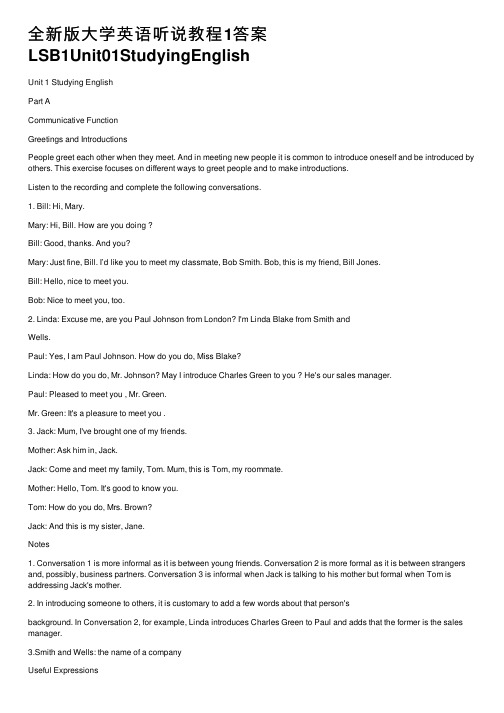
全新版⼤学英语听说教程1答案LSB1Unit01StudyingEnglishUnit 1 Studying EnglishPart ACommunicative FunctionGreetings and IntroductionsPeople greet each other when they meet. And in meeting new people it is common to introduce oneself and be introduced by others. This exercise focuses on different ways to greet people and to make introductions.Listen to the recording and complete the following conversations.1. Bill: Hi, Mary.Mary: Hi, Bill. How are you doing ?Bill: Good, thanks. And you?Mary: Just fine, Bill. I’d like you to meet my classmate, Bob Smith. Bob, this is my friend, Bill Jones.Bill: Hello, nice to meet you.Bob: Nice to meet you, too.2. Linda: Excuse me, are you Paul Johnson from London? I'm Linda Blake from Smith andWells.Paul: Yes, I am Paul Johnson. How do you do, Miss Blake?Linda: How do you do, Mr. Johnson? May I introduce Charles Green to you ? He's our sales manager.Paul: Pleased to meet you , Mr. Green.Mr. Green: It's a pleasure to meet you .3. Jack: Mum, I've brought one of my friends.Mother: Ask him in, Jack.Jack: Come and meet my family, Tom. Mum, this is Tom, my roommate.Mother: Hello, Tom. It's good to know you.Tom: How do you do, Mrs. Brown?Jack: And this is my sister, Jane.Notes1. Conversation 1 is more informal as it is between young friends. Conversation 2 is more formal as it is between strangers and, possibly, business partners. Conversation 3 is informal when Jack is talking to his mother but formal when Tom is addressing Jack's mother.2. In introducing someone to others, it is customary to add a few words about that person'sbackground. In Conversation 2, for example, Linda introduces Charles Green to Paul and adds that the former is the sales manager.3.Smith and Wells: the name of a companyUseful ExpressionsUseful Expressions for Greetings and IntroductionsGreetings●Hello.●How are you doing?●How’s everything?●What’s new?●How’s it going?●Good morning, Jack. How are you?●Hello, Paul. I’ve heard so mu ch about you.●You look great today. How are things?●Hi. How have you been?●Hey, great to see you.●Fancy meeting you here.●Hi, I’ve been looking forward to meeting you.●How nice to see you.●It’s good to see you.Making Introductions●May I introduce (Mr. Wang) to you?●I'd like to introduce (Mr. Wang) to you.●Come and meet (Mr. Wang), our software engineer.●This is (Mr. Wang), my cousin.●Hello. I’m (Wang Ling) from (Beijing).●My name is (Wang Ling).●I’d like you to meet the president of our company, Mr Wang Ling.●Good afternoon, I’m (Wang Ling). Very pleased to meet you.Listening StrategyDetecting Incomplete PlosionIn connected speech when a plosive consonant like /k/, /g/, /t/, /d/, /p/, /b/ is followed by another consonant, it is not fully pronounced. This is called incomplete plosion.Listen and read after the recording, paying attention to the letters in italics.1. Laura is one of the to p students in Gra d e One.2. Te d li k es to sing English po p songs3. Listening is not a bi g problem for me.4.Fran k can spea k si x languages fluen t ly.5.I’d li k e to rea d novels an d shor t stories in English.6.Bo b’s strong local a c cen t ma k es i t difficul t for us to understan d him.Part BPre-listening TaskPair WorkQuestions for DiscussionYou are going to talk about your experience of studying English. Read the following questions and discuss them with your partner.1.When did you start learning English? How long have you studied it?2.Do you like English? Why or why not?3.What do you think of studying English? Is it interesting or boring? Difficult or easy? Givereasons.4.Which accent do you prefer, American or British?5.What is your purpose of studying English?Demo:1. When did you start learning English? How long have you studied it?I started learning English when I was 9 years old. At that time, learning English was a fun. We didn't have any modern equipment like MP3 or radios and we didn't have a good English teacher either. In class we just repeated after the teacher who spoke English with a heavy accent. As she didn't know the International Phonetic Alphabet, she even asked us to use Chinese characters to mark the English sounds. Ten years has passed since I learned to speak the first English word.4. Which accent do you prefer, American or British?Well, I don't have any preference. When I speak English, I don't have to sound like an American or British. All I have to do is speak clearly, so that people can understand me. Actually, young people in Britain find the American accent attractive while young people in the US like British accent. In this aspect, movies play an important role. Many young Americans like to imitate the accent through movies. They think the most appealing aspect of an English man is his accent. For example, many American girls watch Harry Potter movies over and over again just to listen to the actors speak.Language FocusHere are some useful sentences and structures that you might find handy in discussing the above questions:I've studied English for about / more than nine years.I started learning English five / several years ago / in primary / high school.I find English rather difficult / interesting / useful / quite different from Chinese.I find English grammar rather confusing / difficult to understand / beyond me.I prefer an American accent to a British accent / I like the British accent better.English is an international language / one of the most widely used languages in theworld.A good command of English will help me greatly in my study and work.Good English means more chances and opportunities in the job market.With English I can get access to a huge amount of useful information.Listening TasksA Passage Talking about Studying EnglishWord Bankl. freshman n. a student in his first year at a university or college ⼤学⼀年级学⽣2. major v. to specialize (in) 主修n. a student specializing in a certain subject 主修某科⽬的学⽣3. nervous a. worried or slightly frightened 紧张的4. overcome v. to get over 克服5. shyness n. the state of being timid or uncomfortable 害羞6. official n. authorized 官⽅的7. fluent a. able to speak a language easily and without many pauses 流利的8. article n. a piece of writing on a particular subject ⽂章Language and Cultural Notes.1. Background information Listening, speaking, reading and writing are known as the four skills in learning English. Among those listening and reading are regarded as receptive skills while speaking and writing are productive skills. However, it does not follow that listening and reading are passive activities. Take listening for example, To understand a listening text, we need to rely on our knowledge of the sound system, vocabulary, syntax and our ability to infer, to predict, to summarize, etc. The four skills are closely related to each other. So if we want to improve our listening we must improve the other skills as well, especially skills in reading because it is through reading that we get the most language input.2. Freshman A first-year university student. Sophomores, juniors, and seniors are respectivelysecond, third, and fourth year university students.3. Singapore A country in Southeast Asia with a population of about 3.4 million. It has four official languages: Malay, Chinese, Tamil and English. The National University of Singapore is one of the two universities in the country, the other being Nanyan Science and Technology University.4. A library science major A university student whose main field of study is library science.The word "major" can be used both as a noun and as a verb. For example, we can say: "What's your major?" and "I major in English."ScriptTalking About Studying EnglishAt a gathering of students from China and some other countries, Yang Weipingand Virginia Wang, both first-year college students, are talking about their learningof English.Hello, my name is Yang Weiping. I’m a freshman at Beijing University and I’m majoring in Chemistry.At college we have to study a foreign language. I chose English because I like listening to English programs on the radio and TV. I also like British and American pop songs. Some day I hope to visit Britain and the United States.I started learning English several years ago and I’m getting better at it. My favorite activity is listening, especially listening to songs and stories. My big problem is, however, speaking. I feel nervous whenever I speak. And I never seem to know what to say when people talk to me. But I’ve decided to overcome my shyness and learn to speak English by speaking as much as I can.Hi, my name is Virginia Wang. I'm a library science major at the National University of Singapore. In our country, English is important. It is one of the official languages and you have to be fluent in English to get a good job.I've been studying English since high school. I'm good at reading because I like learning about new things and new ideas. There are so many books and articles written in English. Our textbooks at the university are in English, too. I know writing is also very important, but I find it really difficult.When I graduate from the university, I would like a job in the city library where I can read all kinds of new books. Exercise 1:Listen to the recording once and choose the right answer to each question you hear.1. Which of the following would be the best title for the two talks?a. School Lifeb. Studying Englishc. Why Learn a Foreign Language?d. Difficulties in Learning English2. Who are the speakers?a. English majors.b. Senior students at college.c. Beginners in English study.d. Non-English majors at college.Exercise 2Speaking TasksPair WorkListen to the conversations and repeat after the recording. Practise the conversations with your partner, playing the role of A or B. Then work with your partner to create your own conversations by replacing the underlined parts with your own words. Substitution Exercises:Part CAdditional ListeningA Passage How to Improve Listening ComprehensionListen and answer the questions by filling in.1.What’s the speaker’s problem in learning English?He finds listening most difficult, because he worries about the words he doesn’t know.2.How is he trying to overcome the difficulty now?Now he’s trying to focus on the general idea first. Then he’ll listen again carefully and play the difficult parts again if he has any problems.3.Why is he happy with the method?Because in this way he can understand better both the main idea and the details of the listening text.ScriptHow to Improve Listening ComprehensionAmong the four skills of listening, speaking, reading and writing, I find listening most difficult, because I worry about the words I don’t know. Now I’m trying to focus on the general idea, not worrying about the new words. This makes me feel good, because I know I’ve understood something. Then, I listen again carefully and if I have any problems I play the difficult parts again. In this way I come to understand better both the main idea and the details of the listening context.Part DTest Your Listening Short ConversationsYou’re going to hear five short conversations. Listen caref ully and choose the right answers to the questions you hear.1.a.Watching TV.b.Studying Chinese.c.Doing a Chinese test.d.Reviewing his Chinese lessons.2.a.Write a history paper for the woman.b.Help the woman with her history lesson.c.Help the woman finish her history paper.d.Tell the woman how to write a history paper quickly.3.a.The English Department.b.The French Department.c.The German Department.d.The school library.4.a.After his class is over.b.After four o’clock today.c.In a few minutes.d.Sometime after four tomorrow afternoon.5.a.His mother forgot to wake him up.b.He doesn’t have a clock to wake him up.c.He sleeps too late.d.He sleeps too much.Script:1. W: John, why don’t you watch NBA games on TV?M: Oh, I’m studying for a Chinese test tomorrow.Q : What’s the man doing?2. W: Tom, if you can give me a hand, I will be able to get this history paper done quickly. M: Of course I can.Q : What’s Tom going to do?3. M: Excuse me, is this the French Department?W: No, it’s the English Department. The French Department is in the new building opposite the school library, right beside the German Department.Q: What’s the man looking for?4. W: Good morning, Professor Wang. Could I talk to you about my paper now?M: I have a class in a few minutes. How about coming to my office after four tomorrow afternoon?Q : When will the woman see the professor?5. W: Tim, why are you late for class again? You were late yesterday and the day beforeyesterday.M: I’m sorry, Miss. My mother goes to work early. And I overslept because I don’t have an alarm clock.Q: What does Tim say about his being late for class?。
《新编大学实用英语英语教程》(林立总主编)第一册教案

教案课程名称大学英语1教案书写规范与要求一、以每次课为一个备课单元书写。
二、每一备课单元书写下列内容:1.周次、课次、授课时间、章节名称;2.简要说明:教学目的、重点、难点、教学方法和授课手段(包括与课程相关的上机和实验、课件制作等);3.教学主要内容(教案主体)及教学方法手段;4.作业内容。
注:其余授课电子版文件待本课程结束后,交教务处统一刻成光盘存档。
大学英语1 课程授课总体计划书厦门软件职业技术学院教案厦门软件职业技术学院教案厦门软件职业技术学院教案厦门软件职业技术学院教案5 We are surprised at his great __improvement__(improve) in English.Activity 5 Fill in the blanks with the proper form of the words and phrases given in the box.1We got tired of his _endless_ boring speech.2 _Chatting_with friends is a good way of relaxation.3 Our country is rich in natural_resources__.4 Upon arrival,the singer are surrounded by a lot of fans and reporters.5 Tom _spends a lot of time in playing computer games every day.6To my surprise,only a third of the students in my class are interested in skiing.7He seems so quiet,but _actually he likes talking.8These days all the college students are very busy,especially the seniors.9 I sent her a bunch of flowers as a (an) expression of gratitude.10 Our college offers an excellent art program .Step II Grammar代词(Pronouns)一代词的分类二代词的用法1 人称代词注意:(1)人称代词在比较分句中作主语,用主格;作宾语,用宾格,如:She works harder than I (do).她比我用功。
新编实用英语综合教程Unit 1
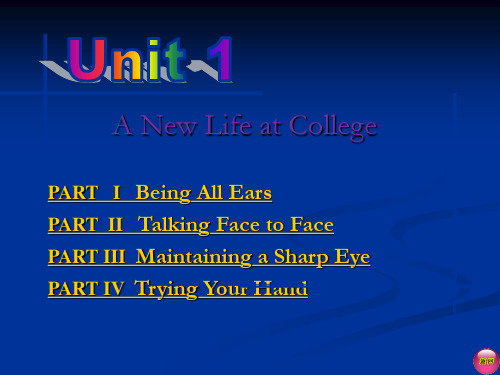
英语听力练习方法之——逆序听力 法
第一,选择听力材料要符合个人实际水平。 太难或太轻易都不好。 第二,反复听十遍还听不清楚,就要查对 原文,以便搞清问题出在那里。有针对性 地学习。 第三,练习完整地听懂一句话之后再默写。 第四,大声跟读。可以边看着记录稿,边 跟播音员朗读。并把自己的声音录下来, 纠正语音。
A New Life at College
PART I Being All Ears
PART II Talking Face to Face PART III Maintaining a Sharp Eye PART IV Trying Your Hand
PART I
Being All Ears
Greetings and Addressing Words to Know Short Conversations Situational Dialogues Passage Listening
Situational Dialogues
Dialogue 1
You will hear a dialogue between Peter and Henry. They happen to meet in the street one day.
1. Where did Peter go? A. Beijing. B. New York.
Passage Listening
PART II
Talking Face to Face
Greetings and Addressing
Follow the samples
Useful Sentences and Expressions
提高口语的方法
大学实用英语听说教程Book1Unit1

.
. They are both interested in China 4. What sports do they love? Lindy likes to play tennis and Willy likes to play basketball . 5. How did they know each other? Willy found the book Lindy was looking for and they began to know each other .
Home
1.
Useful Expressions
Typical Greetings 1. Hello / Hi. 2. How are you? 3. How is it going? 4. How are you doing? 5. How do you do? 6. Glad to see you. / Nice to meet you. 7. How is your family? 8. You look very well today! 9. How are you doing recently? 10. Are you Mr. Roberson?
Exercise 2: Listening for Details 1. Wendy and Brown are colleagues. 2. Wendy and Brown will meet again the day after tomorrow. 3. Wendy would not like to meet Ella. 4. When introduced, Wendy and Ella will meet each other for the first time. 5. Wendy and Ella will be good friends. ( F )
《新编大学实用英语第一册》第二单元听说练习
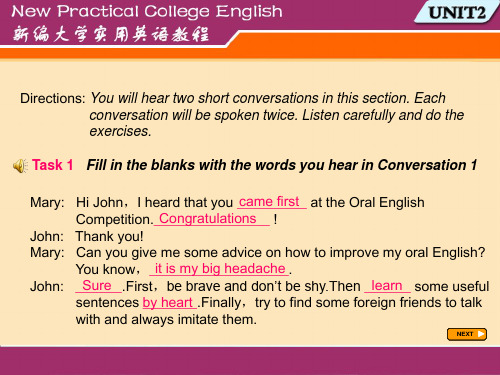
A
PREV.
NEXT
Peter: Li Lin: Peter: Li Lin: Peter: Li Lin:
Peter: Li Lin: Peter: Li Lin: Peter:
Lin,you speak English like Americans.Have you been to America? No,I learn English in China,but my foreign teachers are Americans. That’s incredible! How long have you studied English? Ten years.I began to learn English at the age of 7. Do you like learning English? Yes,I think English learning is very interesting because I can not only make friends with foreigners but also learn something about western culture. Do you have any difficulties in learning English? Of course.There are many difficulties,but the hardest thing is to understand the slang,when communicating with foreigners. That’s easy.Since I am an American,I’d like to help you with that. That’s wonderful! Peter,you are so kind. My pleasure.
新编大学英语视听说教程-Unit1
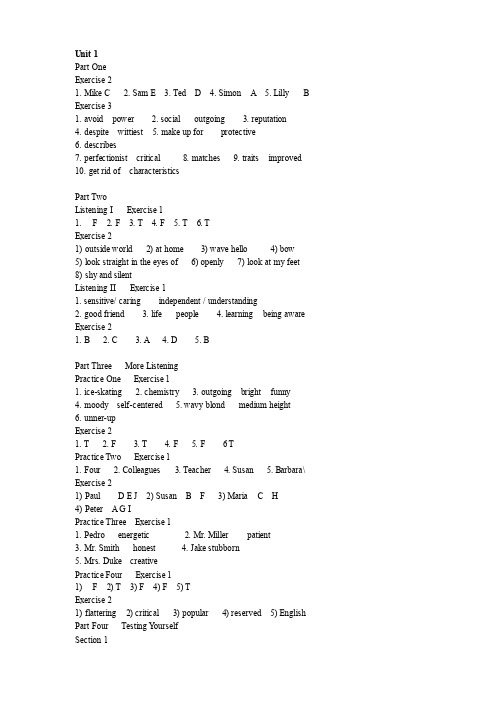
Unit 1Part OneExercise 21. Mike C2. Sam E3. Ted D4. Simon A5. Lilly B Exercise 31. avoid power2. social outgoing3. reputation4. despite wittiest5. make up for protective6. describes7. perfectionist critical 8. matches 9. traits improved 10. get rid of characteristicsPart TwoListening I Exercise 11. F2. F3. T4. F5. T6. TExercise 21) outside world 2) at home 3) wave hello 4) bow 5) look straight in the eyes of 6) openly 7) look at my feet 8) shy and silentListening II Exercise 11. sensitive/ caring independent / understanding2. good friend3. life people4. learning being aware Exercise 21. B2. C3. A4. D5. BPart Three More ListeningPractice One Exercise 11. ice-skating2. chemistry3. outgoing bright funny4. moody self-centered5. wavy blond medium height6. unner-upExercise 21. T2. F3. T4. F5. F 6 TPractice Two Exercise 11. Four2. Colleagues3. Teacher4. Susan5. Barbara\ Exercise 21) Paul D E J 2) Susan B F 3) Maria C H4) Peter A G IPractice Three Exercise 11. Pedro energetic2. Mr. Miller patient3. Mr. Smith honest4. Jake stubborn5. Mrs. Duke creativePractice Four Exercise 11) F 2) T 3) F 4) F 5) TExercise 21) flattering 2) critical 3) popular 4) reserved 5) English Part Four Testing Y ourselfSection 11) upset 2) sensible 3) lecture 4) calm 5) strength6) landed 7) waving 8) perfectly 9) wildly 10) bee Section II1. B2. B3. D4. B5. D6. A7. C8. B Section III1) secretary 2) hard-working 3) efficient 4) private 5) army officer 6) help 7) fond 8) independent 9) shy 10) fifteenUnit 2Part OneExercise 21. C2. B3. D4. B5.AExercise 31. in your hand used to belong to2. practicing with3. talked to each other why not4. ask for find a way5. manage to his own love6. so foolishly jealous7. all three of them8. peacePart TwoListening I Exercise 11. B2. B3. A4. B5. CExercise 21. T2. F3. T4. T5. F6. TListening II Exercise 11. A2. A3. B4. C5. CExercise 21. T2. F3. T4. T5. F6. FListening III Exercise 11) stayed around 2) mouse catcher 3) rats and mice4) got a paw 5) weak and thin 6) make a wooden paw 7) fastened it 8) grow sleek and fat 9) managed 10) peered out cautiously 11) seized it with 12) eighteen micePart Three More ListeningPractice One Exercise 11. B2. A3. A4. C5. DExercise 21. F2.T3. T4. F5.T 6 F 7. F 8.T Practice Two Exercise 11. C D J2. A E G H3. B F IExercise 21. A 2 .B 3. D 4.C 5. B 6. DPractice Three Exercise 11. B2. D3. C4. D5. AExercise 21. F2. T3. F4. F5.F6. TPractice Four Exercise 11. B 2 . C 3. B 4. A 5. D 6. AExercise 21. F2. F3. T4. T5.FPart Four Testing Y ourselfSection 11. C 2 . B 3. C 4. B 5. A 6. CSection II1. T2. F3. F4. F5.T6. F7. T8. TSection III1.18672. shipped ( If these cattle could be brought to Abilene, they could be put on trains and shipped to cities in the North and East.)3. millionaire4. land5. cattle6. million7. cowboys 8. camera 9. hero 10. adventuresUnit 3Part OneExercise 21. D2. C3. B4. E5.AExercise 31. T2. F3. T4. T5.T 6 T 7. F 8.F 9. T 10. FPart TwoListening I Exercise 11. B2. C3. D4. AExercise 21. F2. T3. F4. T5. F6. TListening II Exercise 11. B2. D3. A4. DExercise 21. 30s2. male3. 1.904. long wavy5. heavily built6. light red sweater7. beardListening III Exercise 11. B2. C3. D4. AExercise 21. 4. 5.7Part Three More ListeningPractice One Exercise 11. natural riches2.) desert 3) extinction 4) species5) oxygen 6) economic 7) conservation 8) valuable income9) awareness 10) slow downExercise 21. T2. F3. F4. TPractice Two Exercise 11. F2. F3. T4. TExercise 21. South America, pet food, enough protein, develop2. much more, Asia ,Africa3. position, natural resources, gone down, steady4. continued to rise5. getting richer and richerPractice Three Exercise 11. the first few seconds2. so thin3. beings from another planet4. focused on5. looked directly at6. All around7. until now8. despair, grief and disgust 9. started crying10. who was sleeping peacefullyExercise 21. 2. 3.5.8Practice Four Exercise 11. B 2 . C 3. A 4. CExercise 21) love 2) together 3) mother 4) house 5) school6) friends 7) father 8) month 9) beach 10) callPart Four Testing Y ourselfSection 11) complained about 2) work 3) got out of 4) on the ground 5) shocked 6) cold-blooded killing 7) investigation 8)drug dealing 9) concern 10) against11) strong views 12) using drugs 13) too early 14) respectable 15) accused ofSection II1. C 2 . B 3. A 4. B 5. CSection III1. overcrowded cities2. poverty, disease3. the drift4. registration5. resentment6. attractive7. education services 8. rural lifeUnit 4Part OneExercise 21. Computer programmer2. computer engineering3. internship4. lecture competition5. computer programming skills6. impatient7. constructive 8. medical research 9. management10. ¥3,600Exercise 31. 2.4. 6. 8. 9.11.12Part TwoListening I Exercise 12.3.4.5.7Exercise 21. weaknesses2. similar abilities and interests / important and challenging3. education promotion educated persons4. parents, teachers / benefit /give careful thought /useful suggesti ons / personal quali ti es5. getting money / our future happiness/ combinationListening II Exercise 11. choose their careers2. avoid certain careers3.different professions4.Children’s impressions and prejudices5. lawyers6. accountants7. scientists8. most popular9. least popular 10. ignoranceExercise 21. T2. T3. F4. T5. F6. TPart Three More ListeningPractice One Exercise 11. D2. D3. A4. BExercise 21. sales manager2. salary3. sales commission4. a car5. travel round in6. experience7. university8. on a teamPractice Two Exercise 11.B2.B3. A4.C5. CExercise 21. 65 words 2 . 90 to 100 words3. with languages / translate letters/ answer the phone/ foreign visitors/ second foreign language Practice Three Exercise 11. C2. A3. B4. D5. BExercise 21. ADF2. BF3. ACEPractice Four Exercise 11.sensitive extroverted2.kids3.doing a good job4. tolerance level5. patientExercise 21. T2. F3. T4. F5.TPart Four Testing Y ourselfSection 11. 100 million2. 35 to 403. 7 to 84. office workers many professionals5. 8:00 to 4:006. eight-hour shifts7. Monday Thursday Saturdays Sundays8.choose their own working hours/freedom of choice /happy with Section II1. D2. A3. A4. C5. DSection III1. B2. C3. C4. D5. AUnit 5Part OneExercise 21. B2. A3. C4. E5. D6. FExercise 31. over long distances2. look into3. five times4. individual / group5. sex-specific / males, females, strangers6. great apes7. teach /own kind8. raised/ held / look bigger9. round/ tail –wagging 10. feeding/ every directionPart TwoListening I Exercise 11. plays/ real people/ real life/ emotional problem/ loyalty/ popular2. public speech / make themselves taller/ political one-sided3. soft-soap/ praise/ kindExercise 21. F2. F3. T4. T5.T6.TListening II Exercise 11. C2. A3. DExercise 21. be understood easily2. necessary/ desirable3. splendid4. prevents from achieving5. anxiety / effectPart Three More ListeningPractice One Exercise 11. D2. A3. B4. A5. BExercise 21. permission / apply for2. application form / Web site3. regular mail / fax4. traveler’s checks/ credit cardsPractice Two Exercise 12. 3. 5Exercise 21. T2. F3. F4. T5.T6.TExercise 31. other native languages2. two3. more4. of their choice5. Spanish6. Indian Spanish7. English8. German9. FrenchPractice Three Exercise 11. learner/ teacher/ curriculum2. aptitude/ expectations/ goalsExercise 21. T2. F3. T4. F5.TPractice Four Exercise 11. C2. C3. A4. BExercise 21. Eggs and Toast2. realistic/ goals/ far better than/ forgetting3.determined/ personality/ culture4. unusual/ recite aloudPart Four Testing Y ourselfSection 11. religions2. exist3. 40,0004. cave5. moon6. birth7. records8.agree9. by 10. sense 11. ourselves 12. inhabitSection II1. F2. T3. F4. T5.F6.T7.T8. TSection III1. A2. D3. C4. D5. B6. AUnit 6Part OneExercise 21. D2. A3. B4. C5. C6. AExercise 31. farm animals /hold / feed2. small pets3. bury/ toss them out4. real shame5. dangerous/ destructive/bring disease6.have a point7. humanely /limit8. time/ money/ warm place9. isolated/ company 10. storm of debatePart TwoListening I Exercise 11. B2. C3. D4. BExercise 21. T2. F3. F4. F5.T6.TListening II Exercise 11. Her son2. snake/ crocodile3. quiet4. picky/ particular Exercise 21. big2. dogs3. tiger4.bit5. cat6. friendly7. eat 8. clean 9. wash 10. space 11. noisy 12. train 13. speak 14. keep 15. quietPart Three More ListeningPractice One Exercise 11. 4.5.6.7Exercise 21. A2. B3. C4. A5.DPractice Two Exercise 11.3Exercise 21. for free2. small donation3. $204. hundreds5. eat little6. $507. annual shots8. numerous shots9. diseasePractice Three Exercise 11. C2. B3. D4. C5.AExercise 22.5.6.7Practice Four Exercise 11. C2. C3. A4. B5.DExercise 21. crowding / water/ grass2. what is happening/ low3. target practice/ over the area4. gotten rid of / stayPart Four Testing Y ourselfSection 11. F2. T3. F4. T5.F6.T7.T8. F9.F 10.TSection II1. A2. C3. D4. B5. B6. BSection III1. conserve nature2. donation3. eggs4. meat5. oil6. handbags7. shoes8. fur coats9. ivory 10. reduced 11. 5,000 12. embarrassed 13. advertise the furs14. export bans 15. importation 16. turtlesUnit 7Part OneExercise 21. C2. B3. C4. D5. AExercise 31. fun holiday2. natural scenery/ historical interest3. summer/ too cold4. long history/ vast territory5. feed the monkeys6. as many places as possible7. you name it8. host city/ ancient civilization / modern architecture9. city wall / treat yourselves 10. express trainsPart TwoListening I Exercise 11. C2. B3. B4. C5. D6. AExercise 2Flight number SN 862 SN 863Time 17:50 on July 11 15:10 on July 14Listening II Exercise 1B C F G H IExercise 2Part 1 F T T TPart 2 F F T FPart 3 T T T T FPart Three More ListeningPractice One Exercise 1Advantages ADH Disadvantages EExercise 21. C2. D3. B4. CPractice Two Exercise 11. seedy2. company3. shared4. noisy5. early6. private7. booking8. convenient9. restaurants 10. bathrooms Exercise 21. T2. F3. T4. TPractice Three Exercise 11. Fuel2. Water3. V ehicles4. clothesExercise 21. passing lorries2. enough water3. drinking4. vehicle5. emergency6. self-sufficient7. car repairs8. cost mush / or be costly 9. sweaters 10. European winterPractice Four Exercise 1Occupations B a. actress A. b. actress and author1) A2) B 3) B 4) A5) B 6) A7) A8) BExercise 21. T2. F3. F4. F5.F6.T7.F8. TPart Four Testing Y ourselfSection 11. F2. T3. T4. T5.FSection II1. B2. C3. C4. C5. A6. DSection III1. D2. B3. C4. D5. AUnit 8Part OneExercise 2Section A5,7,1,4,6,3,2Section B 1) F H I 2) A3) CEJ 4) BDGJExercise 31. passed out/ in shock2. back and forth3. knows the reason why4. no doubt/ living without her5. plays a great role6. brilliant boy7. very few cases8. deny/ nature9. bright or not/ CAN 10. thicker than/ genetic relationship11. react to / not to mention 12. hard decisionPart TwoListening I Exercise 11.F2.F3. T4. F5. TExercise 21. genes2. sex3. blood4. tooth5. mirror6. left-handed7. right-handed8. language9. young 10. alike 11. separated 12. apart 13.careers 14. interestsListening II Exercise 11. B2. D3. A4. DExercise 21. 4. 6. 8. 10. 11. 12Part Three More ListeningPractice One Exercise 13. 6. 9Exercise 21. six2. four3. 1954. broad5. slim6. extended7. short 8. elbows 9. knees 10. size-14 11. lungs 12. heartPractice Two Exercise 11.19212. fit the child3. ordinary schools4. adult conceptionExercise 21. good being2. wise3. realistic4. psychology5. freedom to be themselves6. discipline7. suggestion8. religious instruction 9. scholars10. scholars 11. street cleanersPractice Three Exercise 11. C2. B3. C4. BExercise 2 1. F 2. F 3. T 4. F 5.FPractice Four Exercise 11) A2) C 3) D 4) AExercise 21. F2. T3. T4. T5.T6.TPart Four Testing Y ourselfSection 11. talent2. dancing3.creative4. early5.physical6. energy7. less8. curiosity9. particularly 10. cause11. fundamental 12. meaning 13. superior 14. fluently15. read 16. exceptional 17. preparation 18. fullySection II1. F2. T3. F4. F5. T6. F7.F 8 TSection III1. C2. A3. C4. B5.DUnit 9Part OneExercise 21. C2. C3. C4. W5. W6. C7. C8.C9.C 10.W11. W 12. W 13. C 14. W 15. W 16. C 17. W 18.WExercise 31. prefer / old-fashioned2. as old as3. account for4. own/ play/ earn a living5. very proud of6. 1.5 billion / had the chance7. hills / small bridges/ singing of birds8. full of energy9. holes / buttons/ precise notes 10. indirectly/ individualistic 11. places great importance 12. a universal languagePart TwoListening I Exercise 11. restaurants/ airports/ supermarkets / banks2. A. attitudes/ in the right moodB. a better feeling/ the people around himC. happy/ work better3. A. World War II / happy/ calmB. a machine/ kinds of music / different times/ faster/ slower Exercise 21. T2. F3. F4. T5.T6.F7. T8. F Listening II Exercise 11. eases their minds / operations2. classical / instrumental jazz3. A. reduce tension B. 50 / fifty male doctors C. MathematicsD. 1) quickly 2) calmly 3) chosen for them 4) No music5) the worstExercise 21. T2. F3. T4. F5.FPart Three More ListeningPractice OneExercise 1B D A CExercise 21. their own style2. the nature3. sounds / experimented4. songs records5. films/ awardsPractice Two Exercise 11. 1) 2) 3)2. 2) 1)Exercise 21. picks the strings2. as hard as3. makes the notes4. on the strings5. manages the bowExercise 31. learn2. carry3. popular4. satisfying5. progress6. easiest7. less satisfying8. most difficultPractice Three Exercise 11. T2. T3. T4. F5.F6.F7.F8. T Exercise 2Bruce Springsteen: communicative, direct, exciting, simpler Sting: naturalPeter Gabriel:musicalBranford Marsalis: brilliant, humorousY oussou N’Dour:not so heavy/ rhythmic/ sophisticated/unusualPractice Four Exercise 11. A2. B3. A4. C5. AExercise 21. T2. N3. T4. F5.TPart Four Testing Y ourselfSection 11. T2. F3. F4. T5.F6.T7.T8.TSection II2. 4.7. 8. 10. 12Section III1. falling2. nice3. cold4. inside5. raining6. tears7. happen 8. arms 9. fire 10. goneUnit 10Part OneExercise 21. F2. F3. T4. F5.T6.F7. T8. T Exercise 31. terrible rubbish / deafening/ stand2. slow-paced/ peaceful3. concentration on them4. dreamt of / afford5. dwell on the past / more freedom5. keep up with/ totally different 7. have a date8. on the Net/ not unusual 9. adapt to / we have been saying 10. kept complaining / let it bePart TwoListening IExercise 1 1. B 2. A 3. B 4. C 5. BExercise 2 1. T 2. F 3. T 4. F 5.FListening II Exercise 11. quietly2. myself3. pity4. sympathy5. Understanding6. favor7. rocking8. wrong9. tired 10. lazy11. same 12. luckyPart Three More ListeningPractice OneExercise 1 1. name of the ship2. number of people/ passengers3. names of the people/ passengersExercise 21. N2. F3. T4. F5. TPractice TwoExercise 1 1. T 2. T 3. F 4. F 5.F 6.T 7.F 8. T Exercise 21. marvelous2. shines3. lovely4. little team5. the best players6. football stadium7. public8. name 9. notice board 10. in two weeksPractice ThreeExercise 11. beginners’2. copy down3. days of the week4. an 8th day5. sure enough6. convince7. Australia8. that oneExercise 2 1. F 2. T 3. F 4. F 5.TPractice FourExercise 11. work, family, health, friends, spirit2. work / bounce back / marked/ damagedExercise 21. undermine your worth2. special3. set your goals4. take for granted5. meaningless6. slip through your fingers7. all the days8. give up9. stop trying 10. encounter risks 11. to be brave 12. shut 13. give 14. hold 15. wings 16. learn 17. treasure 18. retrieved 19. race 20. journeyPart Four Testing Y ourselfSection I 1. D 2. B 3. D 4.C 5. ASection II 1. C 2. B 3. D 4.A 5. BSection III1. interpret2. forest3. flowers4. chased5.run6. catch7. jumped8. giant9.long 10.black 11. white 12. shaking 13. wet 14. sweet 15. delicious 16. angel 17. grave 18. nights 19. days 20. taste。
Unit One(新编实用英语听力教程1)
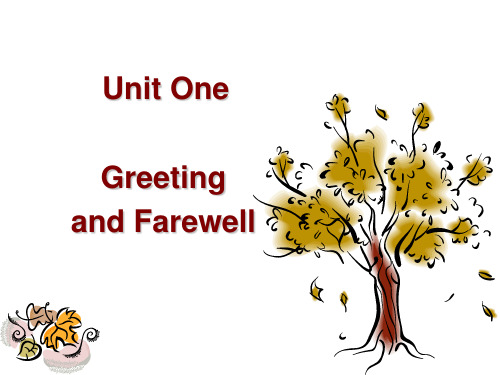
Many British people start a conversation with the stranger by talking about the weather. But young people
tend to do it more casually with only a hello or hi just like
Listen to the following conversation twice and fill in the blanks with the missing words or phrases. Then you will hear a summary of the conversation. Listen to it twice and tell us what the conversation is about.
4. A: It’s a fine day, isn’t it?
B: Yes, it is. 5. A: Liu Hong, how are your studies?
B: Not very good.
6. A: Sorry, I don’t have time today.
B: Well. Bye-bye, have a good day.
实用英语1课后习题答案(unit1-unit5)
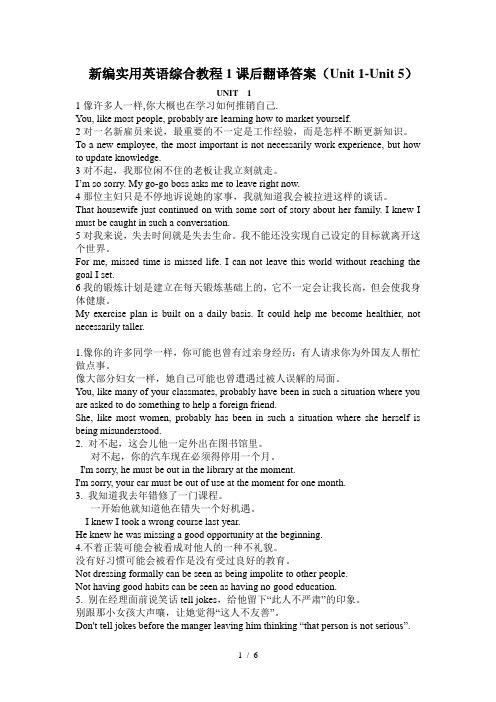
新编实用英语综合教程1课后翻译答案(Unit 1-Unit 5)UNIT 11像许多人一样,你大概也在学习如何推销自己.You, like most people, probably are learning how to market yourself.2对一名新雇员来说,最重要的不一定是工作经验,而是怎样不断更新知识。
To a new employee, the most important is not necessarily work experience, but how to update knowledge.3对不起,我那位闲不住的老板让我立刻就走。
I’m so sorry. My go-go boss asks me to leave right now.4那位主妇只是不停地诉说她的家事,我就知道我会被拉进这样的谈话。
That housewife just continued on with some sort of story about her family. I knew I must be caught in such a conversation.5对我来说,失去时间就是失去生命。
我不能还没实现自己设定的目标就离开这个世界。
For me, missed time is missed life. I can not leave this world without reaching the goal I set.6我的锻炼计划是建立在每天锻炼基础上的,它不一定会让我长高,但会使我身体健康。
My exercise plan is built on a daily basis. It could help me become healthier, not necessarily taller.1.像你的许多同学一样,你可能也曾有过亲身经历:有人请求你为外国友人帮忙做点事。
像大部分妇女一样,她自己可能也曾遭遇过被人误解的局面。
新编大学实用英语第一册第三单元听说练习
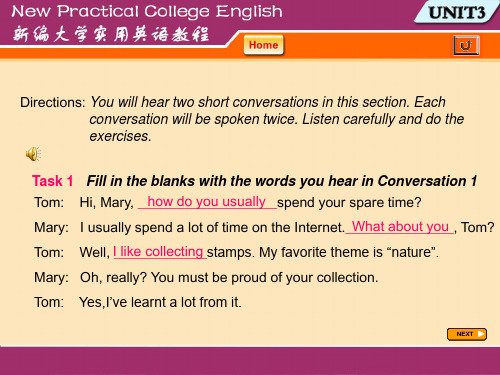
PREV.
A: Hi. Long time no see._H_o_w_’_s_e_v_e_r_y_th_in_g__? B: Fine. It’s so nice to see you here. How is your college life? A: I’m quite busy with both my lessons and entertainment. B: Entertainment?__W_h_a_t_d_o__y_o_u_u_s_u_a_ll_y_d_o__in__yo_u_r__sp_a_r_e__tim__e__? A: I usually go dancing with my classmates._W__h_a_t _a_re__y_o_u_in_t_e_r_e_s_te_d_i_n_? B: I like watching movies. You know I’m a big fan of Tom Cruise. A: _W__h_a_t _d_o_y_o_u__o_ft_e_n_d_o__on weekends? B: I sometimes go mountain climbing with my friends.__W_h_a_t_’s__yo_u_r__fa_v_o_r_ite__s_p_o_rt__? A: I’m fond of jogging. B: Nice talking to you. See you later! A: Me, too. See you next time!
PREV.
Practice
Directions: Suppose you (A) and your friend (B) haven’t seen each other for a long time. You meet and talk about your hobbies. Complete the following conversation by filling in the blanks.
新编大学实用英语教材听力答案

新编大学实用英语教材听力答案英语课程的听力部分是提高学生听力能力和理解能力的重要环节之一。
而《新编大学实用英语教材》所附的听力材料是帮助学生进行听力训练的关键资源。
然而,由于该教材本身未提供听力答案,对于学生来说,找到正确的听力答案变得较为困难。
因此,在这篇文章中,我将为大家提供《新编大学实用英语教材》听力答案,以帮助同学们更好地进行听力练习。
第一单元:Greetings and IntroductionsPart A: Short Dialogues1. A: Hello, how are you?B: I'm fine, thank you. And you?A: I'm fine too. Nice to meet you.B: Nice to meet you too.C. Fine, thank you. And you?2. A: Good morning, Mary.B: Good morning, John.A: How are you today?B: I'm not bad. How about you?A: I'm great, thanks.3. A: Hi, how's it going?B: Not too bad. What about you?A: I'm doing well, thanks.B: That's good to hear.Part B: Short Conversations1. A: Excuse me, is this seat taken?B: No, feel free to sit down.A: Thank you.2. A: Hey, I'm sorry. I didn't mean to bump into you. B: Oh, it's okay. No worries.A: Alright, take care.3. A: Could you please lend me your pen?B: Sorry, I don't have one with me.A: Oh, never mind. Thanks anyway.第二单元:Daily RoutinesPart A: Short Dialogues1. A: What time do you usually wake up?B: I usually wake up at 7 o'clock.A: That's early!2. A: When do you eat breakfast?B: I have breakfast at around 8:30 in the morning. A: That sounds good.3. A: What time do you go to bed?B: I go to bed around 11 p.m.A: Don't you feel tired in the morning?B: Sometimes, but I'm used to it.Part B: Short Conversations1. A: What time does the library open?B: It opens at 9 a.m. and closes at 10 p.m.A: Thank you for the information.2. A: How often do you go to the gym?B: I go to the gym three times a week.A: That's impressive. Keep up the good work! 3. A: When does the bus usually arrive?B: It arrives every 15 minutes.A: That's convenient.第三单元:At the RestaurantPart A: Short Dialogues1. A: Good evening, do you have a reservation?B: Yes, it's under the name of John Smith.A: Let me check. Yes, we have a table reserved for you.2. A: What would you like to order?B: I'll have the grilled chicken, please.A: How do you want it cooked?B: Medium, please.3. A: Can I get you anything else?B: Yes, I'll have a glass of water, please.A: Sure, coming right up.Part B: Short Conversations1. A: Could we have the menu, please?B: Here you go. Feel free to take your time.A: Thank you.2. A: Is the fish fresh today?B: Yes, it was caught this morning.A: I'll have the fish then. Thank you.3. A: Excuse me, is there a vegetarian option?B: Yes, we have a separate vegetarian menu. Would you like me to bring it to you?A: Yes, please. Thank you.以上是《新编大学实用英语教材》第一至第三单元听力部分的答案,希望可以帮助到大家更好地进行听力练习。
新编大学实用英语教程

the passage ▲ use attributive clauses,especially the restrictive
clauses ▲ translate sentences in passive voice ▲ write letters of invitation
New Practical College English
新编大学实用英语教程
Unit 1
Part 1 Listening and Speaking
Supplementary words and expressions
chicken in sweet and sour sauce 糖醋鸡块
sea cucumber
海参
lobster龙虾Chinese mushroom
香菇
sweet soup balls
汤圆
New Practical College English
大学英语听说教程1_Unit 1

grasp the main idea of news reports;
introduce yourself and inquire about others;
understand values of college education in Chinese and Western cultures.
B.They can have an interview with admission officers instead of taking 请替换文字内容 SAT and ACT.
C.They can apply for financial support from private sources. D.They can decide whether to gradu请a替te文字w内it容hin four years.
COLLEGE ENGLISH
LISTENING AND SPEAKING
大学英语听说教程
1BOOK
年度工作概 述• 添加相关标题文字 • 添加相关标题文字
• 添加相关标题文字 • 添加相关标题文字
01 U N I T
A new journey
大学英语听说教程1 Unit 1
CONTENTS
LEARNING OBJECTIVES WARM UP PRONUNCIATION LISTEN TO
2 What can most applicants to The请替G换e文o字r内g容e Washington University do
now?
A.They can choose whether to give the university their SAT and ACT
results.
- 1、下载文档前请自行甄别文档内容的完整性,平台不提供额外的编辑、内容补充、找答案等附加服务。
- 2、"仅部分预览"的文档,不可在线预览部分如存在完整性等问题,可反馈申请退款(可完整预览的文档不适用该条件!)。
- 3、如文档侵犯您的权益,请联系客服反馈,我们会尽快为您处理(人工客服工作时间:9:00-18:30)。
Students may have different answers for some blanks.
PREV.
Directions: You will hear two situational dialogues in this sece.Listen carefully and do the exercises.
NEXT
Task 2 Listen to Conversation 2 and decide whether the following
statements are true (T) or false (F)
1 Kathy and Mike are friends. (T) 2 Mike majors in engineering. (F) 3 Kathy is a new student. (T) 4 Mike wants to know Kathy’s impression on the school. (T) 5 Kathy doesn’t like the teachers in the school. (F)
PREV.
NEXT
A: Hi. B: Hello. A: I’m______. B: I’m______. A: How do you do? Nice to meet you,Miss______. B: How do you do? _N__ic_e_t_o_m__e_e_t_y_o_u__,too.And please call me______. A: Call me______. B: OK. A: I hear this is a great place to work in. B: Yes.It’s a really wonderful place to work in. _I_’d_l_ik_e__to_introduce you to the rest of the team. A: Thank you. B: _C_o_m__e_o_n_.
Li Zheng: Liu Li:
Li Zheng:
Liu Li: Li Zheng:
_H__i ,Liu Li. Hi,Li Zheng. _H_o_w__w_a_s_ your holiday? Oh,I enjoyed it very much.I traveled a lot.__H_o_w__a_b_o_u_t _y_o_u_? I did a part-time job to gain some work experience. So we both had a busy holiday.
are so nice.
PREV.
Practice
Directions: Suppose you(A)and your partner(B)meet for the first time in a company.Your partner has been there for two years while you are new.You greet each other and complete the following conversation by filling in the blanks.
Directions: You will hear two short conversations in this section. Each conversation will be spoken twice. Listen carefully and do the exercises.
Task 1 Fill in the blanks with the words you hear in Conversation 1
2 Among the speakers, who are friends? Anna and _P_e_t_e_r_.
3 Who is a senior student? _P_e_t_e_r_.
4 Who is Anna’s classmate?_R__o_ss__.
5 Where is Ross from?She is from_C__a_n_a_d_a_. Listening script
PREV.
NEXT
Anna: Ross: Anna:
Ross: Anna: Peter: Ross: Peter: Ross:
Hi,Ross. Oh,hi,Anna. I want you to meet some friends of mine.This is my friend Peter.He is a senior student here. Nice to meet you. And this is my classmate Ross. Nice to meet you. Where are you from,Peter? I’m from California.How about you? I’m from Canada.
Task 1 Listen to Dialogue 1 and answer the following questions
1 How many speakers are there in the dialogue? Who are they?
_T_h_r_e_e__.They’re Ross,_A_n_n_a__ and_P_e_te_r__.
Listening script
PREV.
NEXT
Mike: It’s you!What brings you here,Kathy? Kathy: Hi,Mike.I am a new student here and I
major in engineering. Mike: Congratulations!How do you like the school? Kathy: I just love it.It’s so beautiful and the teachers here
